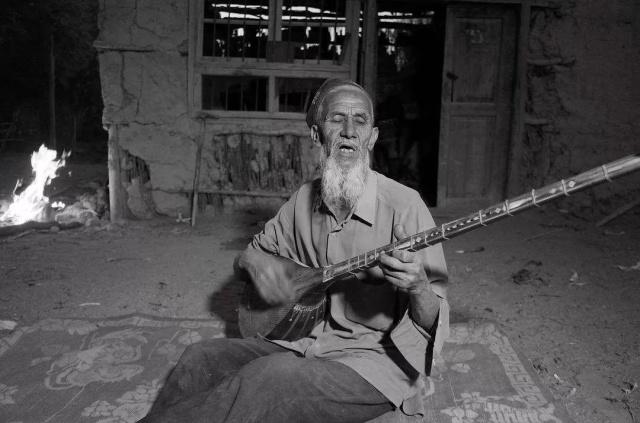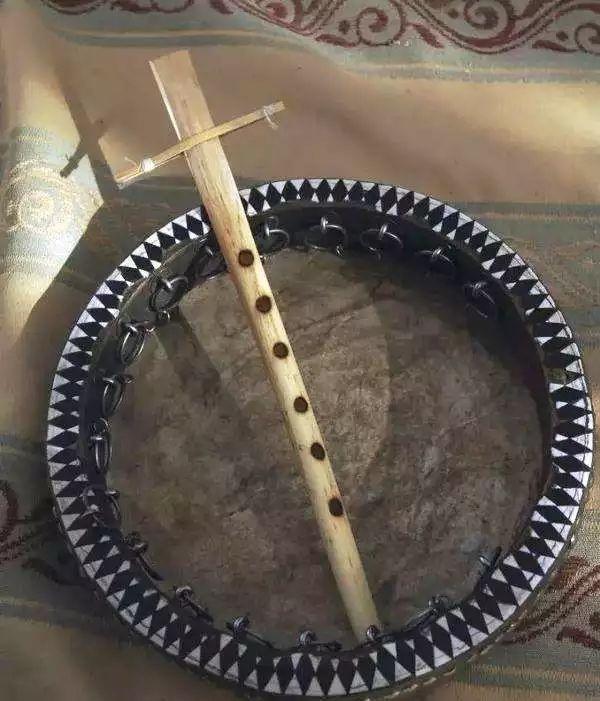In the vast Gobi Desert, shepherds perform the quaint Balaman song
"No one is 90 kilometers north, no one is 8 kilometers south, and no one is 11 kilometers west. The sound of the suona is centered on the Hudabel land, smoothing the entire Gobi Desert."

In Xinjiang, there is a shepherd, Hu Dabaierdi, in Cele County. He and his instrument, Balaman, performed simple and vicissitudes of music. On the vast Gobi Desert, this is a stage that belongs to him alone.
It is hard to imagine that the old man was a shepherd. Or the identity of the old shepherd is just a cover, but in fact he is an excellent musician.
When he was over sixty years old when he played the musical instruments such as "Rewap", "Dutar", "Suona" and "Balaman", he was poetic, like a musical poet. Peaceful, sincere, moving music slowly flows from his compositions. There is a confident aura about him when he plays the music, which is matched with his vigorous and vicissitudes of singing. For a while, the listener was quiet. After hearing it, I couldn't forget the poetry hidden in the song for a long time.
The shepherd Huda Baierdi and his Balaman are the beginning of the sunset here.
Hu Dabai took out his musical instrument, Balaman. His musical instrument was as slender and vicissitudes as he was. Hu Dabaier gently played a song, and the melodious and vicissitudes of music began to dance in the air. The morning light is beautiful, along with the music of Hu Dabaidi.

The method of making Balaman is far simpler than imagined, and the raw material required is nothing more than a common thing - reed.
A 20-centimeter piece of reed is needed, and it becomes a reed by cutting it to a certain extent. In this way, a tube that can always make sound is formed under simple steps. Balaman has begun to take shape.
According to the size of his hand, Hu Dabai made a mark on the corresponding position, and used charcoal to burn holes in the marked position, with seven holes in the front and one hole in the back. The production of Balaman is now complete.Although it seems to be a simple production method, it requires a craftsman to debug and make it in the process. This means that the craftsman must not only be able to make balaman, but also be able to play balaman. That is to say, only those who can play Balaman can master its production method.
Balaman - unique folk instrument
Balaman, this is a unique local folk musical instrument, but there are different legends about its origin.
Some people say that it is an unintentional masterpiece of nature. The insect bites the reed out of a hole, and when the wind blows, it makes a nice sound. People were influenced by it and created Balaman based on the willow flute played by children.Others say that it was the shepherd who discovered the unique music of the reeds when he was driving the sheep. Later, he took a piece of reed, made a hole in the reed pole and played a melodious piece of music.
Regardless of the legend, today's Balaman is indeed formed on the basis of the continuous improvement of future generations.Bala means child in Uyghur language, and Balaman means child's toy.
Shepherds whisper in the wind
He is like a poet, chanting a poem that belongs to him on the vast Gobi Desert.
"No one is 90 kilometers north, no one is 8 kilometers south, and no one is 11 kilometers west. The sound of the suona is centered on the Hudabel land, smoothing the entire Gobi Desert."
The melodious and vicissitudes of music is in the ear, making it easy to calm down and listen to the wind.
"Do you like music?"
"do not know."
In the documentary "Searching for Craftsmanship", although Hu Dabaierdi and the interviewer have different languages, the music he plays is indeed the same.
On the Gobi Desert, he seemed to be standing on his own stage, and his powerful aura and unique music infected every listener.
He said: "Balaman is the treasure of our nation. I will continue to play and do it. As long as I still have a breath, I will continue to play Balaman, so that it can be passed down from generation to generation. "
It is very regrettable that this kind of music, this kind of art will soon disappear.
Because even the son of Huda Baierdi failed to learn that piece of Balaman.
No one has inherited this unique Balaman song and let it float on the vast Gobi Desert. Maybe ten years, maybe twenty years, maybe in a blink of an eye, another skill left us silently.
This Balaman, which belongs to the place, to the culture, and to the tradition, will disappear with the wind. The Balaman music created by the unique human culture will be unknown in the near future. That is the culture of the nation, but it ended up being passed down by no one.
Nowadays, more and more people choose more elegant western music, while the folk music belonging to Chinese tradition is little known. In this increasingly desolate era, many folk music just disappeared in the torrent of the times.
Finally, in the vast Gobi Desert, only a shepherd was left playing his music. Beside the bonfire, a Balaman was played with all the sadness.
 渝公网安备 50010702504639号
渝公网安备 50010702504639号